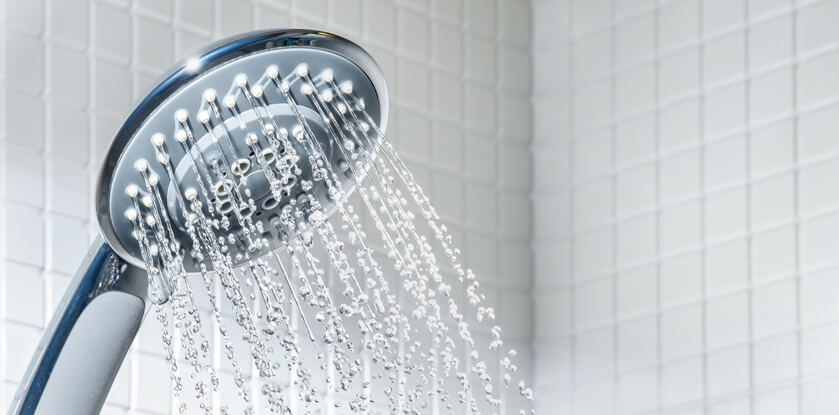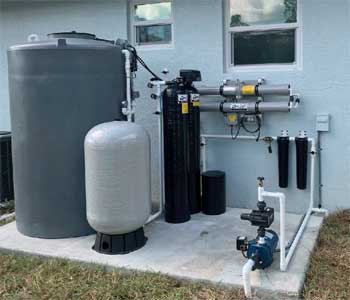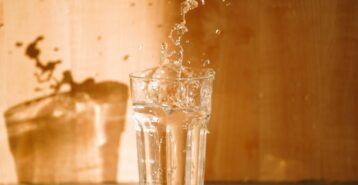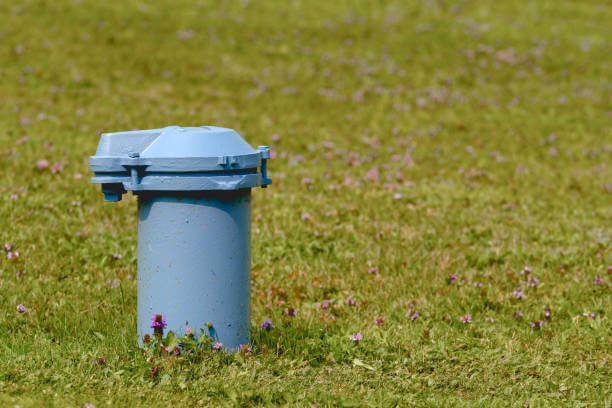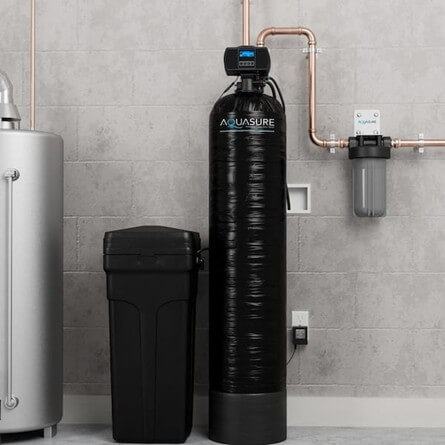What Is a Water Filtration System?
A water filtration system removes harmful and unwanted contaminants and pollutants from the water you use in your home. There are point-of-use filtration systems that are installed under a sink or on a faucet. For this cost guide, we primarily focus on whole-house filtration systems installed near a home’s main water shut-off valve.
How Does Whole-Home Filtration Work?
While the exact steps and type of filtration vary depending on the system you choose (we’ll explain those types further down), the main idea stays the same: Water enters your home, gets filtered, and is distributed to your faucets/appliances. Here’s a quick look at that process:
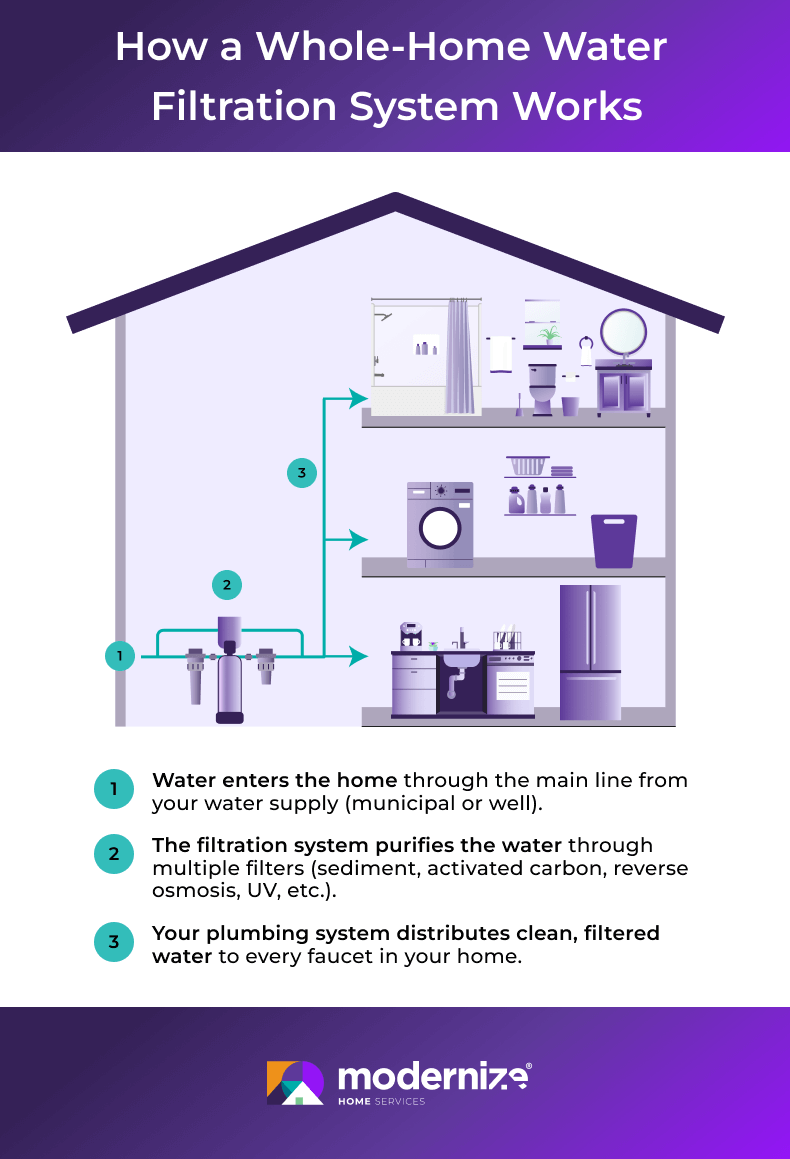
Benefits of Water Filtration Systems
Improved safety of a home’s drinking water is one of the key advantages and selling points of water filtration. Installing a whole-house system offers other important benefits:
- Better-tasting and smelling tap water
- Longer lifespan of household appliances
- Clear plumbing and piping
- Increased energy efficiency of appliances
- Cleaner laundry
- Softer hair and skin
Types and Costs of Residential Water Filtration Systems
Installing a water filtration system in your home typically costs between $1,200 and $5,800, with the average homeowner spending around $2,500. This price includes both the unit and installation labor but doesn’t account for replacement parts or ongoing maintenance. Understanding the different types of filtration systems and their costs can help you choose the best option for your needs and budget.
Each type of water filtration system features a type of water treatment technology that removes or neutralizes specific contaminants, including chemicals, lead, dust, particles, minerals, and bacteria.
| Water Filtration Method | Average Cost |
|---|---|
| Reverse Osmosis | $1,000 - $4,000 |
| Well Water | $1,000 - $5,000 |
| Activated Carbon | $300 - $900 |
| Ionization | $1,000 - $2,000 |
| U/V Light | $500 - $1,500 |
| Water Softeners | $600 - $5,000 |
Reverse Osmosis
Reverse osmosis is one of more popular filtration systems. Water is pre-filtered to remove particles and then forced through a semipermeable membrane that traps contaminants while allowing water molecules to pass through.
Average Cost: $1,000 – $4,000
Well Water Systems
Well water composition and quality varies by location, so filtration systems may include several different stages, including activated carbon, U/V, and reverse osmosis.
Average Cost: $1,000 – $5,000
Activated Carbon Filters
Activated carbon filters work by absorbing chlorine, pesticides, organic chemicals, sediment, and heavy metals before water enters the plumbing system. While they improve water’s overall safety and taste, they are not effective in removing bacteria and other microorganisms.
Average Cost: $300 – $900
Ionization
In this filtration system, water passes through a filter to remove contaminants and is ionized to create alkaline water for everyday household use.
Average Cost: $1,000 – $2,000
UV Purification
Ultraviolet light is used to kill harmful bacteria before water enters your home’s plumbing. U/V filtration only removes bacteria and microorganisms, so it is usually installed with another filtration system that treats chemicals, minerals, and other contaminants.
Average Cost: $500 – $1,500
Water Softeners
These systems treat hard water by removing excess minerals. Water softeners are available using various methods and are often installed alongside another filtration system.
Average Cost: $600 – $5,000
Average Costs of Different Water Filtration Systems
The average cost to install a water filtration system is $1,200 to $5,800. Your cost will largely depend on the type of system, filtration method, and number of stages.
A simple point-of-use filtration system installed on a faucet or under a sink is the most budget-friendly. Popular reverse osmosis systems and well water treatments are more of an investment.
| Types of Filtration Systems | Average Cost | |
|---|---|---|
| Basic Systems | Faucet, under-sink, single carbon filter | $50 - $500 |
| Mid-Range Systems | Activated carbon filters, U/V, Ionization | $600 - $1,500 |
| High-End Systems | Reverse osmosis, well water, water softener | $900 - $5,000 |
Factors Affecting the Cost of a Water Filtration System
Water filtration costs are unique to each household. Installation costs vary and largely depend on your home’s water quality and consumption needs.
Type of Filtration System
The type of system or filtration method typically impacts cost the most.
A simple carbon filter filtration product is generally less expensive than a reverse osmosis or UV system. Systems designed for lead removal or include multiple filtration steps will be the most expensive.
Water Condition
Your property’s water quality may require a certain type of filtration to remove specific contaminants. Well water or water not supplied from a municipal treatment facility may also require specific and expensive home filtration systems.
System Size and Capacity
Your household’s water needs will impact the filtration system’s capacity and flow rate you need. Larger systems with higher flow rates cost more. Some product manufacturers offer a flow rate calculator. To determine your home’s specific needs, consult a professional systems installer or plumber.
Installation Costs
Costs for labor and installation vary by geographic location and product availability. For best results, select a professional water treatment company with experience installing your preferred system.
Maintenance and Replacement Parts
When choosing a water filtration system, consider your long-term costs in addition to the initial installation pricing. Annual maintenance costs for a water filtration system range from $50 to $200.
Additional Water Filtration Costs to Consider
In addition to the pricing considerations mentioned above, several ancillary costs come with a water filtration system.
- Professional Installation: Hiring a professional installer will save you time and reduce the chance of malfunctioning equipment, but it adds $300 to $500 to your project cost.
- Permitting: Depending on your city’s or town’s requirements, you may need a permit for installation, which can add $50 to $500 depending on where you live.
- Additional Accessories: Installation kits, filters, fittings, valves, connectors, and tubing can add $25 to $200 or more to your installation. Check with your preferred manufacturer for accessories that are included and sold separately.
- Water Testing: Home water testing kits cost $20 to $50. For more accurate water quality results, get your home’s water tested by a local water testing laboratory for $50 to $250.
- Additional Plumbing Costs: If your home’s plumbing is older or in need of repair, your piping or parts may need to be replaced to accommodate a filtration system. Plumber rates range from $50 to $200 per hour.
Cost Comparisons and Return on Investment
When determining if a water filtration system makes good financial sense, consider the cost of yearly use of bottled water or water from other sources. Bottled water costs $360 to $600 annually on average. A basic or mid-range filtration system will pay for itself in one to three years, less if you opt for a basic point-of-use system.
Your household may also benefit from additional energy savings, as cleaner water allows plumbing fixtures and major appliances to operate more efficiently.
If your property’s water comes from a well or is otherwise unsafe, you may see a return on your investment when you decide to sell.
Tips for Saving Money on a Water Filtration System
Depending on your purification and consumption needs, installing a water filtration system in your home can be expensive. Here are a few ways to save money on upfront and long-term costs.
DIY Installation
Doing the installation yourself can save $300 to $500, or 11% of your total costs. While faucet or under-sink systems are generally DIY-friendly, professional installation is recommended for more complex systems. Check with your manufacturer if professional installation is required to maintain warranty coverage.
Regular Maintenance
On-schedule filter replacement, inspections, and water testing optimize a system’s lifespan and reduce expensive repairs or early replacement.
Research and Reviews
When researching water filtration system brands, read company reviews from recent customers and on the Better Business Bureau website. Compare costs, performance, and warranty coverage to ensure years of worry-free operation.
Find a Water Filtration System Installer
Because most whole-house water filtration systems are installed along your home’s piping, an experienced plumber is recommended. For water filtration installation experts in your area, use Modernize’s pro finder tool for personalized quotes.
Compare top-rated water treatment pros in your area.
Read real homeowner reviews, explore qualifications, and view promotions. Modernize makes it easy to browse professionals and find one that will be perfect for your project.
